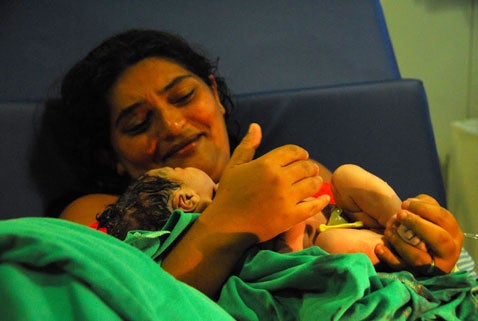

The Pan American Health Organization/World Health Organization (PAHO/WHO), in consultation with a regional expert group, has developed model legislation on reproductive health and healthy motherhood, designed to save the lives of mothers and newborns...
Washington, D.C., 3 December 2013 (PAHO/WHO) — The Pan American Health Organization/World Health Organization (PAHO/WHO), in consultation with a regional expert group, has developed model legislation on reproductive health and healthy motherhood, designed to save the lives of mothers and newborns by preventing avoidable deaths.
The model legislation is presented in the PAHO/WHO publication National Legislation Conforming to International Human Rights Law, which notes that "the lack of equitable and timely access to quality services is the root cause of maternal and neonatal mortality." For this reason, legislation on this subject must be designed to reduce inequities and "guarantee protection of the right to reproductive health and healthy motherhood."
The proposed model legislation recognizes that "international human rights norms include a fundamental commitment by states to ensure that women survive pregnancy and childbirth."
An estimated 95% of maternal mortality can be prevented if women receive quality and timely care. Between 1990 and 2010, maternal mortality in Latin America and the Caribbean declined 44%, short of the 75% decline called for by the Millennium Development Goals (MDGs). Levels of maternal mortality vary significantly from country to country in the region and among different social, economic and ethnic groups, reflecting the region's deep inequities.
"Joint efforts among interdisciplinary teams are essential to identify both gaps and opportunities to develop policies and laws that guarantee reproductive rights and related human rights," says the publication.
The model legislation was developed in consultation with experts from government ministries, human rights organizations, legislative bodies, civil society, and international organizations active in Latin America and the Caribbean. The model sets forth the following basic principles for protection of reproductive, maternal and neonatal health:
- Free access to public health services.
- Guaranteed reductions in gaps based on gender, geographical area, ethnicity or income level.
- Nondiscrimination to ensure access to all.
- Sufficient facilities, goods, public services and health centers as well as programs for sexual, reproductive, maternal and neonatal health.
Guatemala's experience in developing and promulgating its 2010 Healthy Motherhood Law (Ley para la Maternidad Saludable) is described in the publication as a model process. The effort began with a group of indigenous and nonindigenous women who were seeking solutions to high levels of maternal and newborn mortality. Lessons learned from the Guatemalan experience, according to the publication, include:
- Appropriate legislative frameworks can be advanced to guarantee healthy motherhood.
- Proposals should be concrete, feasible and measurable and should incorporate all sectors, including civil society.
- Healthy motherhood requires women's empowerment.
- Information and knowledge can promote the humanization of childbirth and service delivery.
The publication will be the basis for discussion at a seminar for parliamentarians from Latin America and the Caribbean on "Guaranteeing the Right to Reproductive, Maternal, Neonatal and Child Health," which will take place on Dec. 4-5 in Brasilia, Brazil. The seminar is being organized by the Federal Chamber of Brazil with technical cooperation from PAHO/WHO and other partners. Participants will share best parliamentary practices for protecting the health of mothers and children, with the goal of strengthening commitment to actions to accelerate reductions in maternal and neonatal mortality and morbidity.
In September 2011, ministers of health from throughout the Americas approved a regional plan of action to accelerate reductions in maternal mortality, during the PAHO Directing Council. The plan calls for stepped-up implementation of proven interventions and urges countries to "promote a dialogue between institutions in the public and private sector and civil society to prioritize women's lives as a human rights and development issue."
PAHO, founded in 1902, is the oldest international public health organization in the world. It works with its member countries to improve the health and the quality of life of the people of the Americas. It serves as the Regional Office for the Americas of WHO and is part of the Inter-American system.
Links:
- National Legislation Conforming to International Human Rights Law (in Spanish only)
- Seminar for parliamentarians (in Spanish only)
- Plan of Action to Accelerate the Reduction of Maternal Mortality and Severe Morbidity
- Global Strategy for Women's and Children's Health
Media Contacts:
Leticia Linn, linnl@paho.org, Tel. + 202 974 3440, Mobile +1 202 701 4005, Donna Eberwine-Villagran, eberwind@paho.org, Tel. +1 202 974 3122, Mobile +1 202 316 5469, Knowledge Management and Communications, PAHO/WHO—www.paho.org



